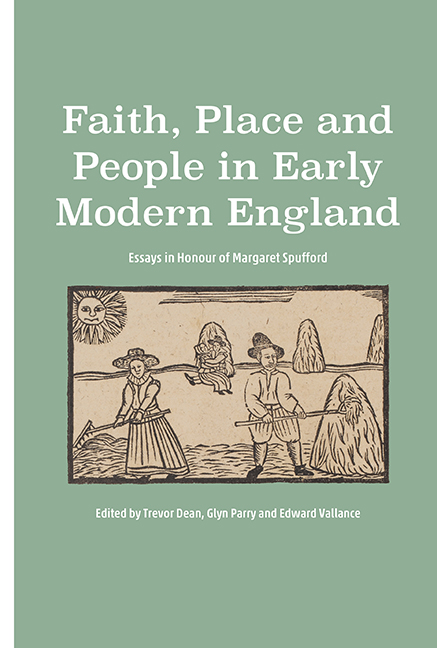Book contents
- Frontmatter
- Dedication
- Contents
- List of Illustrations
- List of Contributors
- Record Office Abbreviations
- Acknowledgements
- Introduction
- Margaret
- Part I Faith
- 1 Religious Divisions in the Localities: Catholics, Puritans and the Established Church before the Civil Wars
- 2 ‘Neither Godly professors, nor dumb dogges’: Reconstructing Conformist Protestant Beliefs and Practice in Earls Colne, Essex, c.1570–1620
- 3 The Sad Fortunes of the Reverend John Perkins: Scenes of Clerical Life in Late Seventeenth-Century England
- Part II Place
- Part III People
- Bibliography of Margaret Spufford's works
- Index
- Tabula in Memoriam
1 - Religious Divisions in the Localities: Catholics, Puritans and the Established Church before the Civil Wars
from Part I - Faith
Published online by Cambridge University Press: 19 July 2019
- Frontmatter
- Dedication
- Contents
- List of Illustrations
- List of Contributors
- Record Office Abbreviations
- Acknowledgements
- Introduction
- Margaret
- Part I Faith
- 1 Religious Divisions in the Localities: Catholics, Puritans and the Established Church before the Civil Wars
- 2 ‘Neither Godly professors, nor dumb dogges’: Reconstructing Conformist Protestant Beliefs and Practice in Earls Colne, Essex, c.1570–1620
- 3 The Sad Fortunes of the Reverend John Perkins: Scenes of Clerical Life in Late Seventeenth-Century England
- Part II Place
- Part III People
- Bibliography of Margaret Spufford's works
- Index
- Tabula in Memoriam
Summary
The appearance of Margaret Spufford's Contrasting Communities in 1974 transformed our understanding of the experience of religion and devotion at the parochial level in the century and a half following the Reformation. That it took a social and economic historian to focus the attention of ecclesiastical and political historians on the lived experience and religious context in which the bulk of the population negotiated their spiritual relationship with God, and how that informed their social relationships with their neighbours, says much about the boundaries that existed within the historical sub-disciplines up to that date. It is no surprise that Spufford was a pioneer in breaking down the boundaries between those historical approaches: her earlier work focused on the economic and social life of country men and women as they went about their daily lives, and to that scholarly work she brought her own personality, which was rooted in a deep understanding of the importance of religion to each individual and to the networks upon which she or he depended, be they household, family or neighbour. That understanding informed the later chapters of Contrasting Communities and brought a number of doctoral students to study with her, who continued and developed her approach, culminating in the collection of essays which she edited and introduced as The World of Rural Dissenters 1520–1725, in 1995. Spufford's work was focused on the Protestant dissenting experience, and both her own work and that of her students did much to reveal the extent to which these dissenters, both Lollards before the Reformation and Quakers after the Restoration, notwithstanding their religious separateness, were firmly socially embedded in their local communities. These essays identified dissenters not so much with the periphery, but with part of the mainstream of local society in many neighbourhoods. In terms of religious culture, the work of Spufford's students produced a more nuanced understanding of that porous boundary between what we might term, and what contemporaries called, ‘the godly’ and the dissenters, those accused by ecclesiastical authority who refused to bend to its will.
When I reviewed The World of Rural Dissenters, I commented on the fact that a large section of the ‘dissenting’ religious population were not discussed within its pages – that is to say, the Catholics – and that some consideration of these, in the light of another book which appeared shortly after Contrasting Communities, might prove profitable.
- Type
- Chapter
- Information
- Faith, Place and People in Early Modern EnglandEssays in Honour of Margaret Spufford, pp. 29 - 42Publisher: Boydell & BrewerPrint publication year: 2018
- 1
- Cited by

